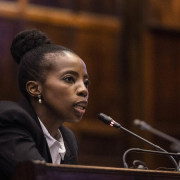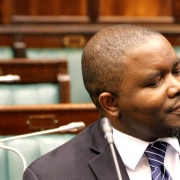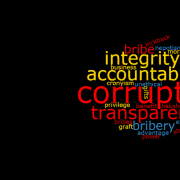|
Getting your Trinity Audio player ready...
|
 The fight against corruption stepped up a notch yesterday in Johannesburg, with the official launch of the Anti-Intimidation and Ethical Practices Forum (AEPF). This body has been established to help professionals in certain fields who are being intimidated for exposing corruption in the workplace.
The fight against corruption stepped up a notch yesterday in Johannesburg, with the official launch of the Anti-Intimidation and Ethical Practices Forum (AEPF). This body has been established to help professionals in certain fields who are being intimidated for exposing corruption in the workplace.
AEPF’s eight founding organisations are the Association of Certified Fraud Examiners of SA (ACFESA); Crime Line; the Ethics Institute of South Africa (EthicsSA); the Institute of Directors of Southern Africa (IoDSA); the Institute of Internal Auditors of South Africa (IIASA); the Institute of Risk Management of South Africa; the South African Institute of Chartered Accountants (SAICA); and the South African Institute of Professional Accountants.
AEPF was started in May 2014 by the eight bodies which, according to its website, were concerned about the “rising levels of corruption in the country and the concomitant increase in the intimidation of the ‘guardians of governance’ i.e. professionals who work in fields such as auditing, risk management and governance.”
A major spur to action and a cause of concern for the forum, said Dr Claudelle van Eck, AEPF chairperson and CEO of the IIASA, was the increasing number of reports from people belonging to the various member organisations, that they are intimidated when trying to raise issues around corruption, or when they want to blow the whistle within their organisations.
“More and more we hear the question – what are you, the professional bodies, doing to protect us?” she said. “This is a serious matter. From the perspective of the IIASA, in the last three years we’ve even lost internal auditors – killed, as a result of what they were doing.”
Professional bodies can no longer claim that they don’t know what is happening in terms of corruption, or feel that they can’t say anything about what is going on, Van Eck added. The same applies to individual members.
“When we come together as professional bodies, we have a stronger voice.”
Other guests included accountant-general Michael Sass from the National Treasury, CEO of IoDSA Angela Oosthuizen, Crime Line head Marisa Oosthuizen, EthicsSA CEO Deon Roussouw, Jaco de Jager, CEO of ACFESA, and Muneer Hassan, a senior executive at SAICA. Deputy public protector Kevin Malunga was the keynote speaker.
From a Corruption Watch perspective, whistleblowers are at the heart of the organisation’s business, as they provide the reports on corruption in their communities and workplaces, so the launch of the AEPF is a welcome development.
Corruption costs the country dearly
“We have literally lost R700-billion to corruption in the last 20 years, according to the Institute for Accountability,” Van Eck noted. “R30-billion is stolen every year from the government coffers, through its tendering system. If we talk about losses between $1-million and $100-million, South Africa ranks the highest according to PricewaterhouseCoopers.”
Another worrying factor, said Van Eck, is the increasing gap between the haves and the have-nots as a result of corruption. “Corruption eats into the wealth of the nation and increases poverty, and the current income inequality is a big issue – every now and then we get a reminder, as we’ve seen with recent events in Soweto and other areas.”
But while whistleblowers are key to reducing levels of corruption, in South Africa they don’t have the kind of incentives that those in other countries may have, said Malunga. “We don’t make it worth people’s while to blow the whistle – only risks, honesty and national pride are associated with whistleblowing. We should seriously consider the idea of a bounty.”
As a further incentive, AEPF would provide whistleblowers with confidence to report as they know that they will be protected, he added. The forum provides advice to potential whistle-blowers in the various represented fields on how to blow the whistle safely, responsibly and effectively.
Malunga also urged more punishment for those “caught with their hands in the cookie jar”.
Making sure that professionals know and do their duty
Objectives of the AEPF include :
- Giving members of professional bodies a platform to take part in and raise their concerns about corruption and intimidation
- Educating and providing practical advice, support and guidance to individuals who are intimidated and helping them to make protected disclosures responsibly
- Acting collectively to lobby government or governmental bodies to improve whistle-blower legislation and policies
- To be a collective professional voice calling for improved governance and greater accountability within the public and private sectors in SA
“There are a lot of professionals who don’t know what the law says about their obligations [regarding corruption],” said Van Eck. “We need to educate our members on this, and also on how they can go about blowing the whistle and who they can speak to. If they are being intimidated, how do we help them and steer them through it?”








